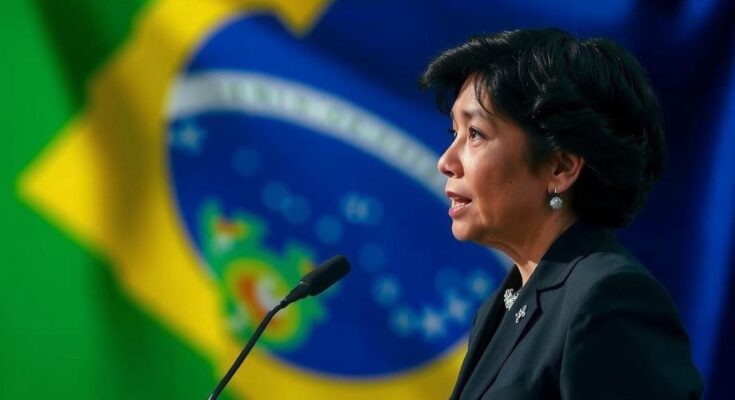Brazilian Climate Change Minister Marina Silva rebuked Argentina’s withdrawal from COP29, asserting it contradicts global climate efforts but is unlikely to disrupt key negotiations. Silva highlighted the shared costs of climate change and the need for accountability. Vice-President Geraldo Alckmin condemned President Milei’s denial of climate science, noting potential economic repercussions for Argentina, although bilateral relations would remain stable.
Brazil’s Environment and Climate Change Minister Marina Silva criticized Argentina’s recent withdrawal of its delegation from the Conference of Parties 29 (COP29), asserting that such a move contradicts global climate efforts. However, she expressed confidence that President Javier Milei’s decision would not hinder ongoing negotiations for advanced countries to support less developed nations in adapting to new environmental agreements. Silva emphasized the universal cost of climate change and the necessity for all nations to fulfill their obligations to mitigate its impacts on people and industries. Additionally, Minister Silva noted the significant progress made at the upcoming G20 Summit, highlighting discussions surrounding payments for ecosystem services and taxation of the wealthy. This gathering in Rio de Janeiro, scheduled for November 18-19, is expected to integrate climate and financial agendas critically. Vice-President Geraldo Alckmin echoed Silva’s concerns regarding Milei’s denial of climate issues, emphasizing the role of scientific advancements in improving public health and life expectancy. Alckmin also warned that Argentina might face economic consequences due to its stance, which could negatively affect its GDP. Despite differing views, he assured that state relations between Brazil and Argentina would remain unaffected.
The ongoing global discourse on climate change necessitates active participation and commitment from all countries, particularly in the context of international agreements such as the Paris Agreement. The Conference of Parties (COP) plays a crucial role in fostering collaboration among nations to address climate challenges. Argentina’s withdrawal from these discussions raises concerns about collective action and responsibility towards addressing the impacts of climate change, which affect all economies and ecosystems.
In summary, Minister Marina Silva’s remarks underscore the global imperative for all countries to engage earnestly in addressing climate change, emphasizing that any withdrawal from commitments undermines societal welfare. The discussions at the G20 Summit are pivotal, aiming to align economic frameworks with environmental obligations. As nations grapple with these challenges, the importance of scientific evidence in policy-making remains critical to safeguarding public health and promoting sustainable development.
Original Source: en.mercopress.com




